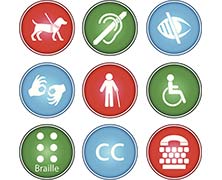Engaging Consumers
The ability to engage and involve people with disabilities in the scientific process is vital to the long-term goals of both researchers and consumers. This expo area highlights potential avenues for delivery of information and links to groups that help to involve consumers in the formulating of knowledge.
This free KTDRR webcast on the importance of stakeholder engagement in disability-focused research and addresses why research projects should focus on engagement.
The importance placed on outcome studies in medical rehabilitation has grown dramatically in recent years as clinicians and researchers have been required to find cost-effective means of providing patient care. At SRALab, the Center for Rehabilitation Outcomes Research (CROR) is responsible for conducting outcomes research.
The Center for Rehabilitation Outcomes
Midwest Regional SCI Model System staff have launched a new video series that provides insights and inspiration to living life after SCI. Check back periodically for updated videos.
- Video: Beyond the Research with Kenneth Hill (from MRSCICS Matters newsletter, Summer 2019)
- MRSCICS Matters newsletter archive
- CROR Outcomes newsletter archive: https://www.sralab.org/node/84332 Description: Midwest Regional SCI Model System staff have launched a new video series that provides insights and inspiration to living life after SCI. Check back periodically for updated videos.
Cochrane Consumer Network (CCNet)
The Cochrane Consumer Network helps healthcare consumers participate in their own healthcare decisions by helping them engage directly with scientific evidence.
Consumers United for Evidence-based Healthcare
Consumers United for Evidence-based Healthcare (CUE) is a national coalition of health and consumer advocacy organizations committed to empowering consumers to make the best use of evidence-based healthcare.
Engaging Ways to Engage Stakeholders
During the 2018 KT Conference, Engaging Ways to Engage Stakeholders, presenters emphasized the importance of incorporating stakeholder participation into project planning and implementation. Stakeholder engagement in research and development processes generally aims to increase topic and product relevance; improve procedures, subject recruitment in particular; and inform how findings are interpreted, embedded in dissemination and technology products and applied in practice and policy.
You may also find this presentation from our 2019 KT Conference useful:
The Power of Engagement: Community-Based Organizations and Knowledge Mobilization
This 2019 KT Expo session includes examples of how to achieve knowledge mobilization in the community-based sector, including embedding youth engagement in practice, facilitating the use of evidence-based practice through organization-to-organization mentorship, knowledge-sharing videos, and innovation funding.
Research & Training Center on Disability in Rural Communities - University Of Montana
Description: Involving consumers in disability research helps ensure the products of research are relevant and useful. Research and Training Centers across the country work hard to incorporate consumers into the research process and are mandated to do so by their primary funding agency, the National Institute on Disability, Independent Living and Rehabilitation Research, (NIDILRR).
"Voices of Experience" video series
A 10-part video series for people with new spinal cord injuries that features people who have been living with spinal cord injuries for years. They know…They’ve lived it.

